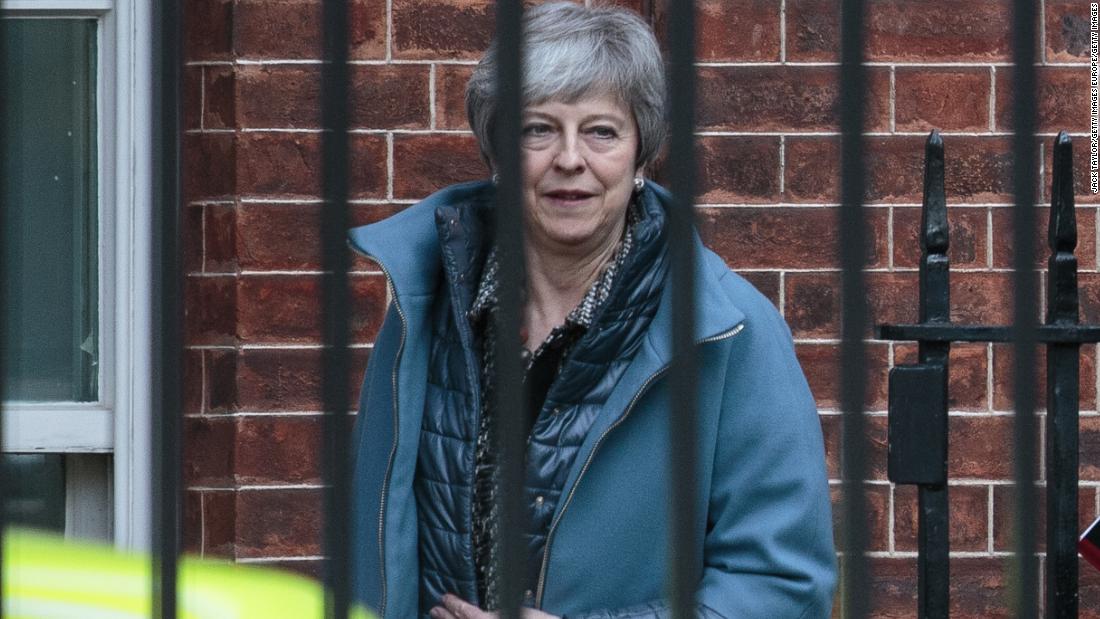
Everyone is utterly exhausted, but there is no end in sight.
On Monday night, the UK Parliament failed to reach a majority on an alternative plan to Theresa May's Brexit deal. Despite a second day of highly unusual circumstances in which they seized control of proceedings of the House of Commons, lawmakers could not take a game off the prime minister.
On Tuesday, the ball is back in her court. It is what she does next that could see one side finally declaring victory.
Risky option
As the deadlock in parliament runs into its fifth month, there is growing talk of a general election.
On Tuesday, May will chair a mammoth five-hour meeting of her Cabinet, the first three hours of which will be purely political, without civil servants -- meaning only Conservative Party business can be discussed. This detail has fueled rumors that the prime minister is considering an election as one way of getting more clarity -- and, in theory, to get a mandate for one type of Brexit over another.
Downing Street has publicly insisted that an election is not on the cards -- but May's aides have certainly been discussing it, as other options run out. However, from the prime minister's point of view, an election now would be too high risk and could put opposition Labour party under Jeremy Corbyn in power.
At the Cabinet meeting Tuesday, there is likely to be fierce disagreement over a way forward. There are now only 10 days left until the new Brexit deadline of April 12, and, as it stands, the UK is due to leave the EU with no deal.
No consensus
The simplest next steps are for the Prime Minister to try to put her Brexit deal to the Commons for a fourth time, after it was rejected on three previous occasions.
This would be an extremely optimistic scenario, given lawmakers voted last week by a majority of 58 against it. But at least that margin of defeat has been decreasing with each new vote: The first delivered a majority of 230 against May's deal, the largest in British political history against a government, while the second had a margin of 149.
Perhaps, by seeing the lack of support for an alternative, enough of her own MPs (members of Parliament), and some crucial opposition lawmakers who are keen to get on with Brexit, could switch their vote.
But there is also the prospect of lawmakers getting a third day in which they control the Commons, presenting another opportunity for more so-called indicative votes on an alternative plan. This could happen Wednesday, with a meaningful vote on May's plan potentially on Thursday.
Four "soft Brexit" options were put to the Commons on Monday night, all of which were defeated: an ongoing customs union with the EU, Common Market 2.0 which would see the UK retain access to the single market, a safety backstop which would leave the door open to revoking Article 50 and suspending Brexit, and a second referendum.
The closest of these votes was on a customs union, with a majority of just three against it. The tightness of the results gives hope to lawmakers hunting for a compromise and trying to avoid the UK crashing out of the EU without a deal next Friday.
There are also suggestions that soft-Brexit compromisers should put forward a motion that combines aspects of two or more of the alternative options, with the aim of reaching critical mass.
Anything possible
Before any more voting can take place, however, May has to get through her five-hour Cabinet meeting without anyone resigning.
The number of Cabinet ministers in favor of a no deal has reportedly reached double figures, and a proportion of them are on resignation watch today -- particularly if there is a suggestion of a third day of indicative votes. This group could press the prime minister to accept a no deal Brexit -- in the absence of support for anything else.
Likewise, some ministers in favor of either a softer Brexit or remaining in the EU could quit if it would help avoid a no deal and support a customs union or similar arrangement. This second group of ministers will be interesting to watch, as if they left government they would be free to back an alternative compromise.
But this marathon battle of wills has shown that anything can happen.
May and her government have been staunchly opposed to a second referendum on Brexit, but the Times of London reports that Philip Hammond, May's finance minister, will say at Cabinet that another nationwide vote should be considered.
He will, according to the newspaper, argue that the country and government cannot afford a general election but a referendum must be on the table unless the prime minister considers a compromise deal.
At this stage, and after so many weeks, is anyone capable of finishing the match and resolving Brexit?
Bagikan Berita Ini














0 Response to "May's endless Brexit has left the UK exhausted"
Post a Comment